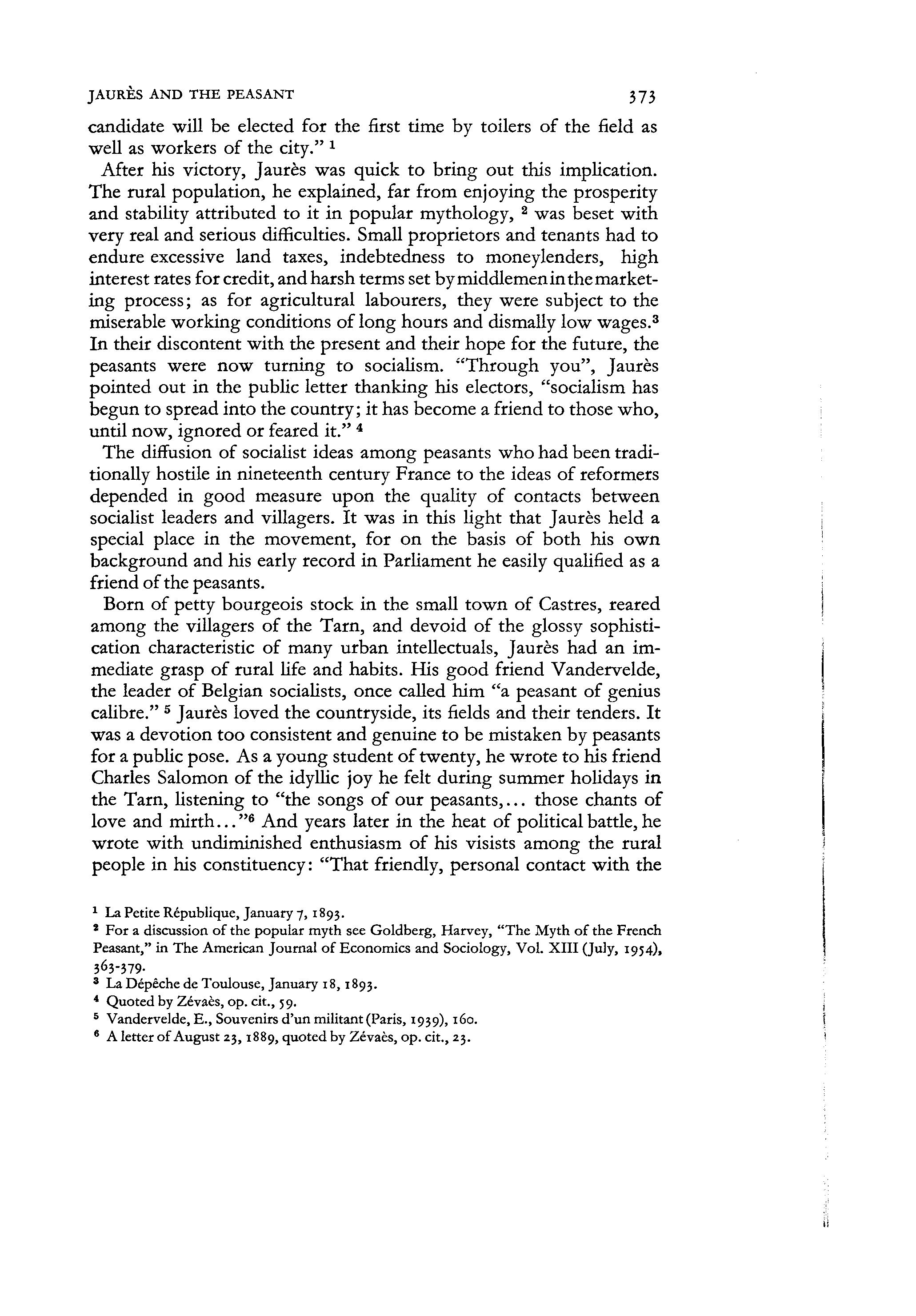JAURES AND THE PEASANT
candidate will be elected for the first time by toilers of the field as well as workers of the city." 1
After his victory, Jaures was quick t o bring out this implication. The rural population, he explained, far from enjoying the prosperity and stability attributed t o it in popular mythology, 2 was beset with very real and serious difficulties. Small proprietors and tenants had t o endure excessive land taxes, indebtedness t o moneylenders, high interest rates for credit, and harsh terms set by middlemen in the marketing process; as for agricultural labourers, they were subject t o the miserable working conditions of long hours and dismally low wages. 3 I n their discontent with the present and their hope for the future, the peasants were now turning t o socialism. "Throug h you", Jaures pointed out in the public letter thanking his electors, "socialism has begun t o spread into the country; it has become a friend t o those who , until now, ignored or feared it. " 4
The diffusion of socialist ideas among peasants who had been traditionally hostile in nineteenth century France t o the ideas of reformers depended in good measure upo n the quality of contacts between socialist leaders and villagers. I t was in this light that Jaures held a special place in the movement, for on the basis of bot h his own background and his early record in Parliament he easily qualified as a friend of the peasants.
Born of petty bourgeois stock in the small tow n of Castres, reared among the villagers of the Tarn, and devoid of the glossy sophistication characteristic of many urban intellectuals, Jaures had an immediate grasp of rural life and habits. His good friend Vandervelde, the leader of Belgian socialists, once called him "a peasant of genius calibre." 5 Jaures loved the countryside, its fields and their tenders I t was a devotion to o consistent and genuine t o be mistaken by peasants for a public pose. As a young student of twenty, he wrote t o his friend Charles Salomon of the idyllic joy he felt during summer holidays in the Tarn, listening t o "the songs of our peasants,.. . those chants of love and mirth..." 6 And years later in the heat of political battle, he wrote with undiminished enthusiasm of his visists among the rural people in his constituency: "Tha t friendly, personal contact with the
1 La Petite Republique, January 7, 1893
s For a discussion of the popular myth see Goldberg, Harvey, "The Myth of the French Peasant," in The American Journal of Economics and Sociology, Vol XIII (July, 1954), 363-}79-
3 La Depeche de Toulouse, January 18,1893.
4 Quoted by Zevaes, op cit., 59
6 Vandervelde, E., Souvenirs d'un militant (Paris, 1939), 160
6 A letter of August 23,1889, quoted by Zevaes, op cit., 23
37 3
Core terms of use, available at https://www.cambridge.org/core/terms. https://doi.org/10.1017/S002085900000095X Downloaded from https://www.cambridge.org/core. IP address: 207.241.231.80, on 19 Jul 2018 at 03:18:29, subject to the Cambridge

robust, democratic peasantry envigorates me and increases my enthusiasm for new and expanded efforts in their behalf." 1
I t was this periodic transfusion into his political life of direct contacts which separated Jaures from that dehumanizing tendency of showing concern only for man in the abstract. Knowing men, he though t of them, rather than of ideal types. I t is difficult t o measure the relationship between his experience and his doctrine, but it is doubtless true that much of his central conception of justice was rooted in the scenes of his life. For as one commentator has suggested, "he knew the humble folk; he felt their pains..." 2 The peasantry of the Tarn was never uniformly or unanimously in his camp,of course; 3 cries of "a bas Jaures! " could be heard during the bitter election campaign of 1898 when clerical forces were so active against supporters of Dreyfus.4 Yet in the to p leadership of French socialism there was n o other as well placed geographically t o understand and sympathize with the problems of the countryside.5
Durin g his Parliamentary initiation, which he served between 1885 and 1889, the young Jaures had n o connection with any organized branch of socialism. But he was a strong supporter of the Republic as the key t o progress and of social reform as the instrument for justice. The problems of French agriculture, which were imposing themselves on all of France in the 1880's, thus commanded his active attention.
The signs of economic distress in the French countryside were not to o difficult t o discern for one wh o represented a rural district. The symptom of the problem, the effect rather than the cause, was the decline in the proportio n of rural t o urban population. Thus the rural population, which had constituted 67.6 per cent of the total in 1876,
1 La Depeche de Toulouse, September 9,1897
2 Pignatel, Fernand, in Pignatel, F., ed., Jaures par ses contemporains (Paris, 1925), 8.
3 There was throughout the nineteenth century, and there exists even today, the strong influence in rural areas of the clergy and of landed notables. They have acted as bulwarks against social change. See the discussion of their role in Fauve, J., "Les paysans" in Duverger, ed., Partis politiques et classes sociales (Paris, 1955), 174-177. See also Friedmann, G., ed., Villes et Campagnes (Paris, 1955), chap ix
4 Auclair, op cit., 324-326
5 The 1892 Inquiry into agricultural statistics revealed the following data on the Department of the Tarn: (a) of the 50,305 farm persons, 34,132 were listed as proprietors when 12,772 tenants, sharecroppers, and day labourers, who owned insignificant holdings, were included; 16,173 were listed as completely without land; (b) there was sharp inequality in the size of holdings: 29,566 cultivators had holdings of less than one hectare, totaling 17,600 hectares; at the other end, only 1444 cultivators had very large holdings, covering 203,600 hectares
Conditions of this sort in the Tarn provided, of course, the most direct data for Jaures The statistics cited can be found in, Ministere de l'Agricole, Statistique agricole de la France, Resultats generaux de Penquete decennale de 1892 (Paris, 1897)
37 4 HARVEY GOLDBERG
Core terms of use, available at https://www.cambridge.org/core/terms. https://doi.org/10.1017/S002085900000095X Downloaded from https://www.cambridge.org/core. IP address: 207.241.231.80, on 19 Jul 2018 at 03:18:29, subject to the Cambridge
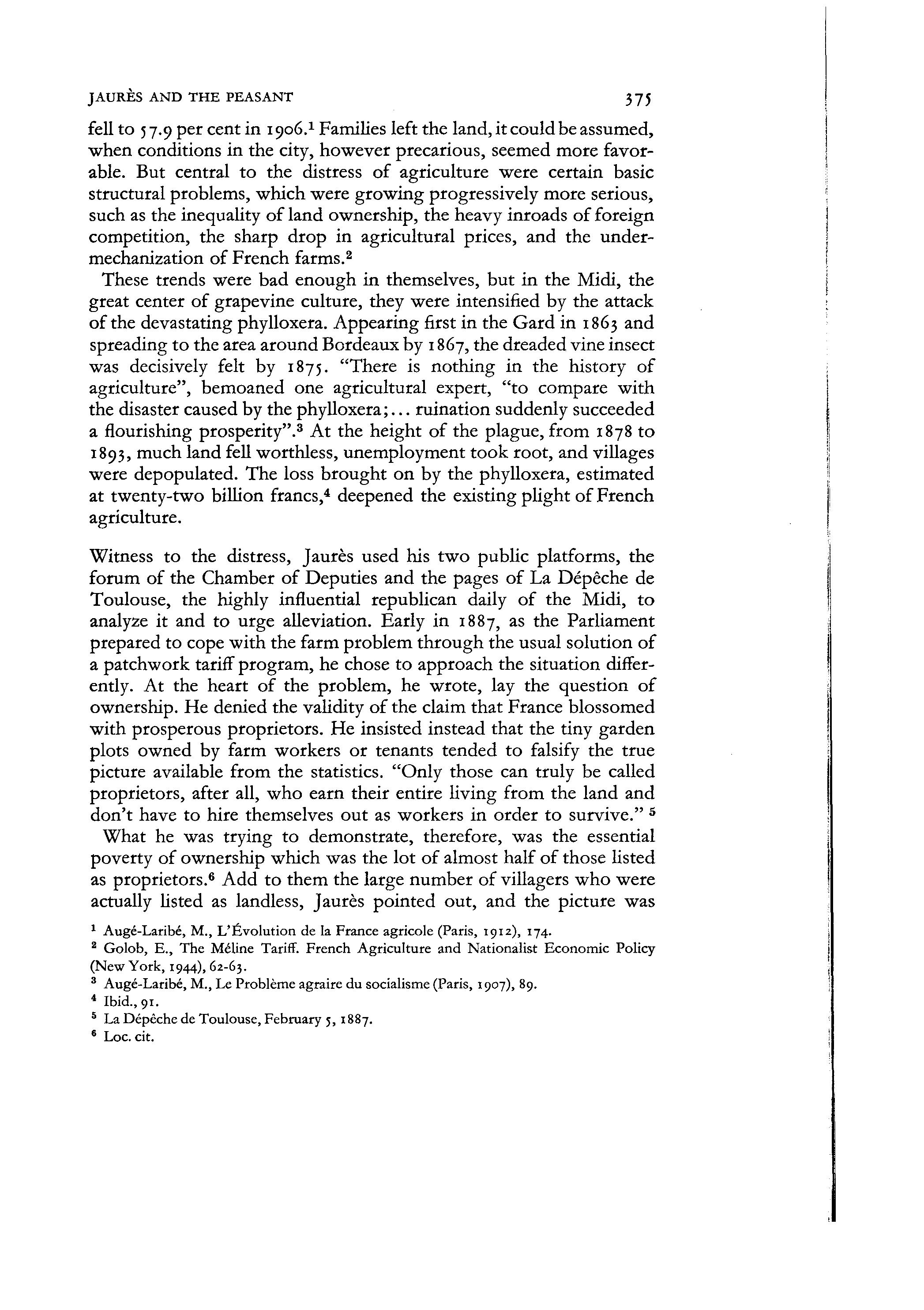
fell t o 57.9 per cent in 1906.1 Families left the land, it could be assumed, when conditions in the city, however precarious, seemed more favorable. But central t o the distress of agriculture were certain basic structural problems, which were growing progressively more serious, such as the inequality of land ownership, the heavy inroads of foreign competition, the sharp dro p in agricultural prices, and the undermechanization of French farms.2
These trends were bad enough in themselves, but in the Midi, the great center of grapevine culture, they were intensified by the attack of the devastating phylloxera. Appearing first in the Gard in 1863 and spreading t o the area around Bordeaux by 1867, the dreaded vine insect was decisively felt by 1875 "There is nothing in the history of agriculture", bemoaned one agricultural expert, "t o compare with the disaster caused by the phylloxera;.. . ruination suddenly succeeded a flourishing prosperity".3 At the height of the plague, from 1878 t o 1893, much land fell worthless, unemployment too k root , and villages were depopulated. The loss brough t on by the phylloxera, estimated at twenty-two billion francs,4 deepened the existing plight of French agriculture
Witness t o the distress, Jaures used his tw o public platforms, the forum of the Chamber of Deputies and the pages of La Depeche de Toulouse, the highly influential republican daily of the Midi, t o analyze it and t o urge alleviation. Early in 1887, as the Parliament prepared to cope with the farm problem throug h the usual solution of a patchwork tariff program, he chose t o approach the situation differently. At the heart of the problem, he wrote, lay the question of ownership He denied the validity of the claim that France blossomed with prosperous proprietors. He insisted instead that the tiny garden plots owned by farm workers or tenants tended t o falsify the true picture available from the statistics. "Only those can truly be called proprietors, after all, who earn their entire living from the land and don't have t o hire themselves out as workers in order t o survive." 5
What he was trying t o demonstrate, therefore, was the essential poverty of ownership which was the lot of almost half of those listed as proprietors.6 Add t o them the large number of villagers wh o were actually listed as landless, Jaures pointed out, and the picture was
1 Auge-Laribe, M., L'Evolution de la France agricole (Paris, 1912), 174
2 Golob, E., The Meline Tariff French Agriculture and Nationalist Economic Policy (New York, 1944), 62-6}
3 Auge-Laribe, M., Le Probleme agraire du socialisme (Paris, 1907), 89.
4 Ibid., 91.
5 La Depeche de Toulouse, February 5, 1887.
6 Loc. cit.
37 5
JAURES AND THE PEASANT
Core terms of use, available at https://www.cambridge.org/core/terms. https://doi.org/10.1017/S002085900000095X Downloaded from https://www.cambridge.org/core. IP address: 207.241.231.80, on 19 Jul 2018 at 03:18:29, subject to the Cambridge
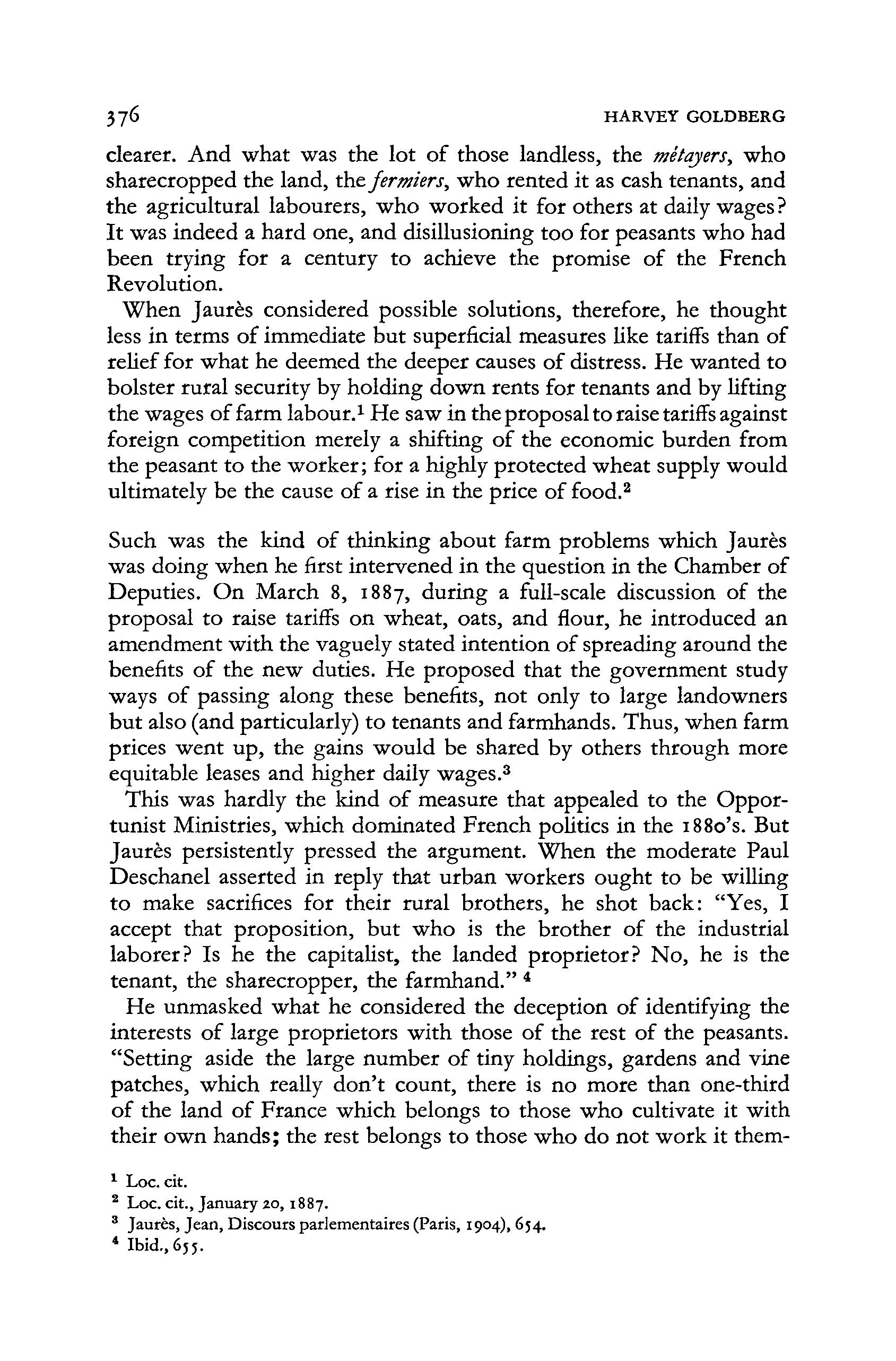
clearer. And what was the lot of those landless, the metayers, who sharecropped the land, the jermiers, wh o rented it as cash tenants, and the agricultural labourers, wh o worked it for others at daily wages? I t was indeed a hard one, and disillusioning to o for peasants who had been trying for a century t o achieve the promise of the French Revolution
When Jaures considered possible solutions, therefore, he thought less in terms of immediate but superficial measures like tariffs than of relief for what he deemed the deeper causes of distress. He wanted t o bolster rural security by holding down rents for tenants and by lifting the wages of farm labour.1 H e saw in the proposal t o raise tariffs against foreign competition merely a shifting of the economic burden from the peasant t o the worker ; for a highly protected wheat supply would ultimately be the cause of a rise in the price of food.2
Such was the kind of thinking about farm problems which Jaures was doing when he first intervened in the question in the Chamber of Deputies. On March 8, 1887, during a full-scale discussion of the proposal t o raise tariffs on wheat, oats, and flour, he introduced an amendment with the vaguely stated intention of spreading around the benefits of the new duties. He proposed that the government study ways of passing along these benefits, not only t o large landowners bu t also (and particularly) t o tenants and farmhands. Thus, when farm prices went up , the gains would be shared by others through more equitable leases and higher daily wages. 3
This was hardly the kind of measure that appealed t o the Opportunist Ministries, which dominated French politics in the 1880's. But Jaures persistently pressed the argument. When the moderate Paul Deschanel asserted in reply that urban workers ought t o be willing t o make sacrifices for their rural brothers, he shot back: "Yes, I accept that proposition, but wh o is the brother of the industrial laborer? Is he the capitalist, the landed proprietor? No , he is the tenant, the sharecropper, the farmhand." 4
He unmasked what he considered the deception of identifying the interests of large proprietors with those of the rest of the peasants. "Setting aside the large number of tiny holdings, gardens and vine patches, which really don' t count, there is n o more than one-third of the land of France which belongs t o those wh o cultivate it with their own hands ; the rest belongs t o those wh o do no t work it them-
1 Loc cit
2 Loc cit., January 20,1887
3 Jaures, Jean, Discours pariementaires (Paris, 1904), 654
4 Ibid., 655
37 6 HARVEY GOLDBERG
Core terms of use, available at https://www.cambridge.org/core/terms. https://doi.org/10.1017/S002085900000095X Downloaded from https://www.cambridge.org/core. IP address: 207.241.231.80, on 19 Jul 2018 at 03:18:29, subject to the Cambridge

selves." 1 The problem then revolved around the question of whether th e tariffs would benefit only those wh o owned the farms or also those wh o laboured upon them.2 As a strong believer in the Republic, Jaures concluded his presentation by urging his colleagues t o create laws substantially different from those of the previous regimes: "A party cannot stand for the same things as its enemies withou t abdicating its position. When it begins t o resemble them, it n o longer resembles itself." 3
The proposed amendment of Jaures was finally voted down by the margin of 327 t o 215. But he had accomplished at least tw o things throug h his part in the debate. He had laid down the main lines of his lon g investigation of agriculture, centering it around the data on rural social structure and thus drawing him close t o a position most useful i n the socialist movement. And he had affirmed his faith in the democratic forum, his belief that a deputy wh o keeps talking, manages {as one modern critic has put it) "t o expose abuses which would otherwise never have been mentioned." 4
I n the months that followed Jaures tried t o formulate the details of a farm program, using his standard of social justice as a yardstick.5 He fruitlessly urged reforms upo n the Floquet Ministry, which was far more concerned in 1888 with the threat of Boulanger than with the plight of peasants. Among the flow of suggestions he made were proposals t o lessen the financial burden of petty proprietors. Once he urged the lowering of railroad freight rates t o facilitate marketing ; 6 frequently he returned t o the striking inequities in a tax system which imposed a 10 per cent levy on a peasant's land purchase and only 1 per cent on an heir's inheritance.7 With equal vigor he urged alleviation of pressures by private interests, wh o controlled the transportation system, the insurance companies, and the credit institutions.8
Jaures measured the condition of the villagers by those standards of justice and dignity which, however vague in description, were the mainsprings of his social theory. I t seemed especially distressing t o him
1 Loc cit
2 Inthei89 2 statistical survey the number of proprietors, even counting those non-owners who possessed merely a tiny patch, came to 50.83 per cent of the rural population Taking away those non-owners, one arrives essentially at the one-third figure suggested by Jaures. These data are cited by Goldberg, op. cit., 371.
8 Jaures, op. cit., 657.
4 Forster, E M., Two Cheers for Democracy (New York, 1951), 70
6 See, for example, La Depeche de Toulouse, June 18, September 3 and 10, 1887
8 Loc. cit., April 8 and August 5,1888.
7 Loc cit., July 7,1889
8 Loc cit
37 7
JAURES AND THE PEASANT
Core terms of use, available at https://www.cambridge.org/core/terms. https://doi.org/10.1017/S002085900000095X Downloaded from https://www.cambridge.org/core. IP address: 207.241.231.80, on 19 Jul 2018 at 03:18:29, subject to the Cambridge
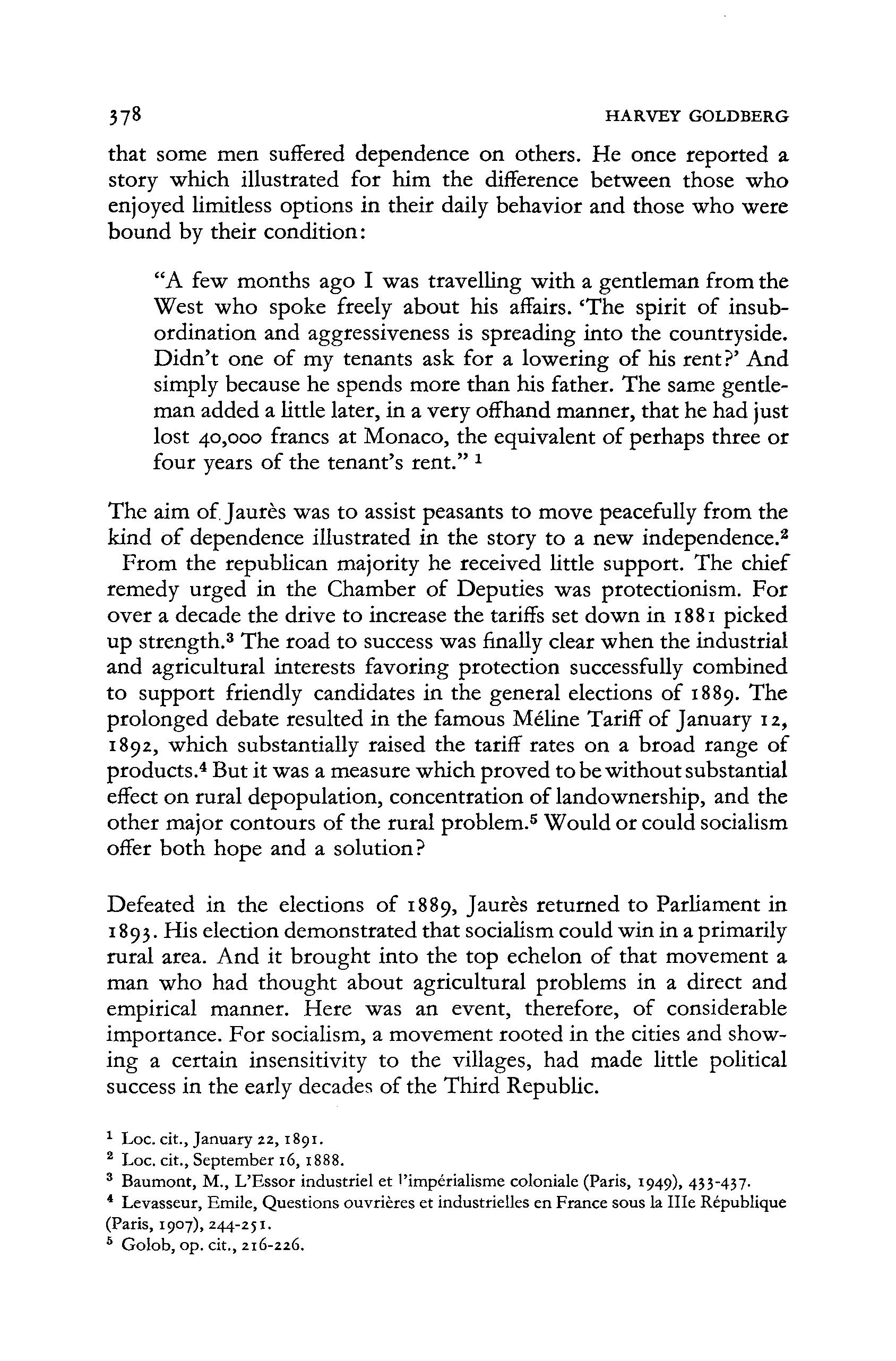
that some men suffered dependence on others. He once reported a story which illustrated for him the difference between those wh o enjoyed limitless options in their daily behavior and those who were boun d by their condition:
"A few months ago I was travelling with a gentleman from the West who spoke freely about his affairs. 'Th e spirit of insubordination and aggressiveness is spreading into the countryside Didn' t one of my tenants ask for a lowering of his rent? ' And simply because he spends more than his father. The same gentleman added a little later, in a very offhand manner, that he had just lost 40,000 francs at Monaco, the equivalent of perhaps three or four years of the tenant's rent. " *
The aim of. Jaures was t o assist peasants t o move peacefully from the kind of dependence illustrated in the story t o a new independence.2 From the republican majority he received little support. The chief remedy urged in the Chamber of Deputies was protectionism. For over a decade the drive t o increase the tariffs set down in 1881 picked up strength.3 The road t o success was finally clear when the industrial and agricultural interests favoring protection successfully combined t o support friendly candidates in the general elections of 1889. The prolonged debate resulted in the famous Meline Tariff of January 12, 1892, which substantially raised the tariff rates on a broad range of products.4 But it was a measure which proved t o be without substantial effect on rural depopulation, concentration of landownership, and the other major contours of the rural problem.5 Would or could socialism offer bot h hope and a solution?
Defeated in the elections of 1889, Jaures returned t o Parliament in 1893. His election demonstrated that socialism could win in a primarily rural area. And it brough t into the to p echelon of that movement a man wh o had though t about agricultural problems in a direct and empirical manner. Here was an event, therefore, of considerable importance. Fo r socialism, a movement rooted in the cities and showing a certain insensitivity t o the villages, had made little political success in the early decades of the Third Republic.
1 Loc cit., Januar y 22,1891
2 Loc . cit., Septembe r 16, 1888.
3 Baumont , M. , L'Esso r industrie l et 1'imperialisme coloniale (Paris, 1949), 453-437
4 Levasseur, Emile , Question s ouvriere s et industrielles en Franc e sous la Hi e Republique (Paris, 1907), 244-251
6 Golob , op cit., 216-226
HARVEY GOLDBER G
Core terms of use, available at https://www.cambridge.org/core/terms. https://doi.org/10.1017/S002085900000095X Downloaded from https://www.cambridge.org/core. IP address: 207.241.231.80, on 19 Jul 2018 at 03:18:29, subject to the Cambridge
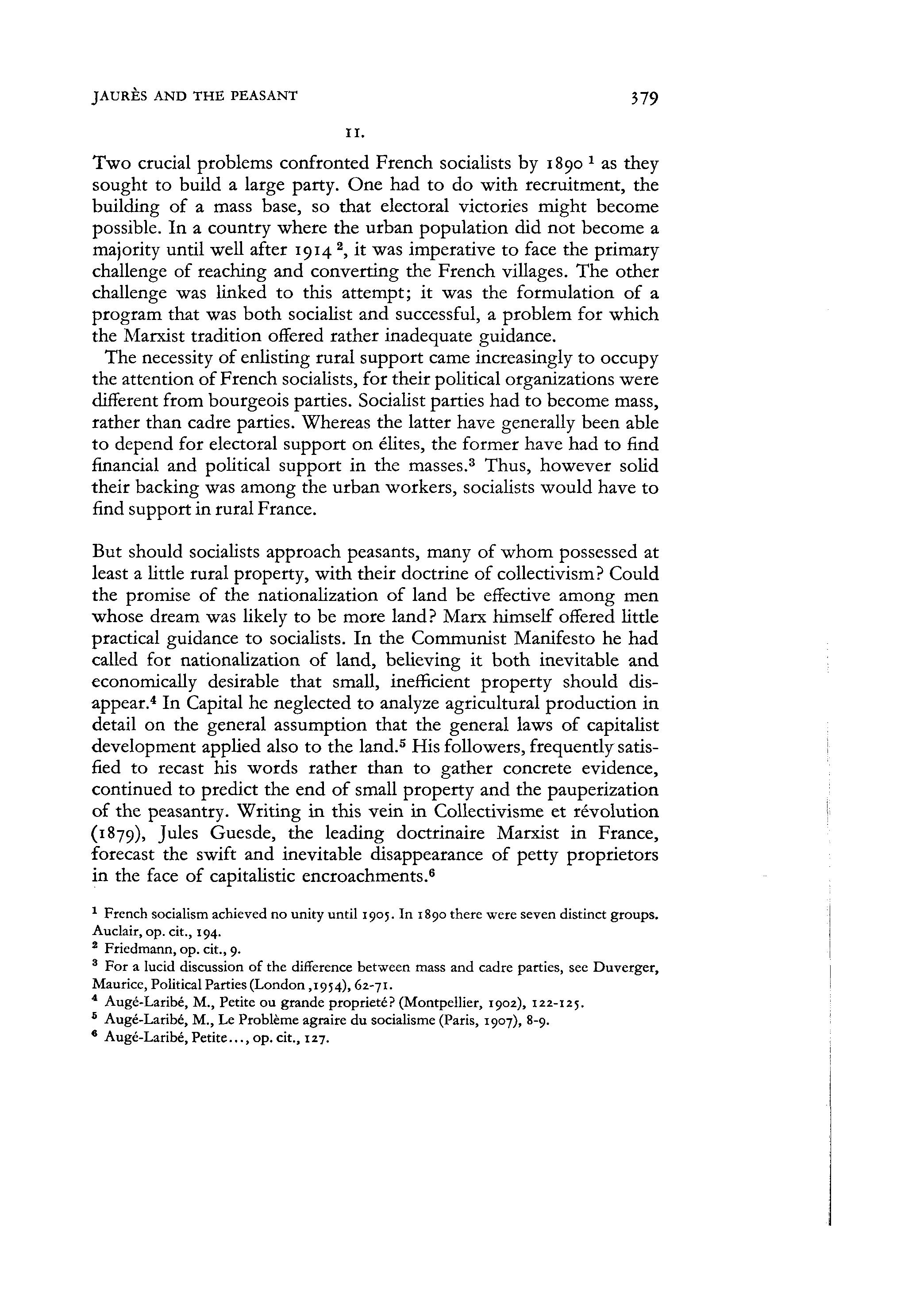
II .
Tw o crucial problems confronted French socialists by 1890 1 as they sought t o build a large party. One had t o do with recruitment, the building of a mass base, so that electoral victories might become possible. I n a country where the urban population did not become a majority until well after 1914 2 , it was imperative t o face the primary challenge of reaching and converting the French villages. The other challenge was linked t o this attempt; it was the formulation of a program that was bot h socialist and successful, a problem for which the Marxist tradition offered rather inadequate guidance.
The necessity of enlisting rural support came increasingly t o occupy the attention of French socialists, for their political organizations were different from bourgeois parties. Socialist parties had t o become mass, rather than cadre parties. Whereas the latter have generally been able t o depend for electoral support on elites, the former have had t o find financial and political support in the masses. 3 Thus, however solid their backing was among the urban workers, socialists would have t o find support in rural France
But should socialists approach peasants, many of who m possessed at least a little rural property, with their doctrine of collectivism? Could the promise of the nationalization of land be effective among men whose dream was likely t o be more land? Marx himself offered little practical guidance t o socialists. I n the Communist Manifesto he had called for nationalization of land, believing it bot h inevitable and economically desirable that small, inefficient property should disappear. 4 In Capital he neglected t o analyze agricultural production in detail on the general assumption that the general laws of capitalist development applied also t o the land.5 His followers, frequently satisfied t o recast his words rather than t o gather concrete evidence, continued t o predict the end of small property and the pauperization of the peasantry. Writing in this vein in Collectivisme et revolution (1879), J u l e s Guesde, the leading doctrinaire Marxist in France, forecast the swift and inevitable disappearance of petty proprietors in the face of capitalistic encroachments.6
1 French socialism achieved no unity until 1905. In 1890 there were seven distinct groups. Auclair, op cit., 194
2 Friedmann, op. cit., 9.
3 For a lucid discussion of the difference between mass and cadre parties, see Duverger, Maurice, Political Parties (London ,1954), 62-71.
4 Auge-Laribe, M., Petite ou grande propriete? (Montpellier, 1902), 122-125
5 Auge-Laribe, M., Le Probleme agraire du socialisme (Paris, 1907), 8-9
' Auge-Laribe, Petite... , op cit., 127
JAURES AND THE PEASANT 37 9
Core terms of use, available at https://www.cambridge.org/core/terms. https://doi.org/10.1017/S002085900000095X Downloaded from https://www.cambridge.org/core. IP address: 207.241.231.80, on 19 Jul 2018 at 03:18:29, subject to the Cambridge
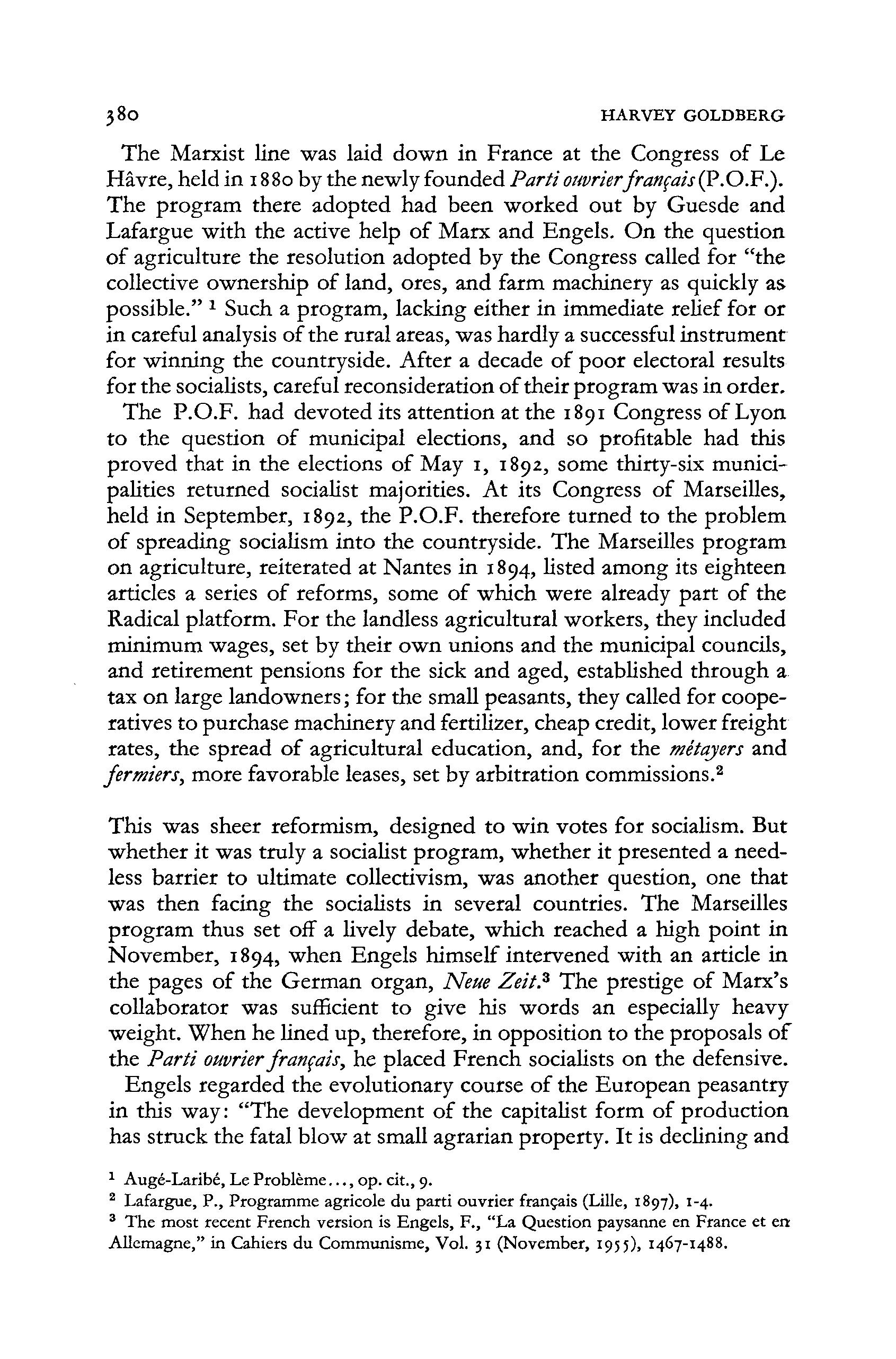
The Marxist line was laid down in France at the Congress of Le Havre, held in 1880 by the newly founded Parti ouvrierfran$ais(P.O.F.). The progra m there adopted had been worked out by Guesde and Lafargue with the active help of Marx and Engels. O n the question of agriculture the resolution adopted by the Congress called for "the collective ownership of land, ores, and farm machinery as quickly as possible." x Such a program, lacking either in immediate relief for or in careful analysis of the rural areas, was hardly a successful instrument for winning the countryside. After a decade of poo r electoral results for the socialists, careful reconsideration of their program was in order.
The P.O.F . had devoted its attention at the 1891 Congress of Lyon t o the question of municipal elections, and so profitable had this proved that in the elections of May 1, 1892, some thirty-six municipalities returned socialist majorities. At its Congress of Marseilles, held in September, 1892, the P.O.F therefore turned t o the problem of spreading socialism int o the countryside. The Marseilles program on agriculture, reiterated at Nantes in 1894, listed among its eighteen articles a series of reforms, some of which were already part of the Radical platform. Fo r the landless agricultural workers, they included minimum wages, set by their own unions and the municipal councils, and retirement pensions for the sick and aged, established through a tax on large landowners; for the small peasants, they called for cooperatives t o purchase machinery and fertilizer, cheap credit, lower freight rates, the spread of agricultural education, and, for the metayers and fermiers, more favorable leases, set by arbitration commissions.2
This was sheer reformism, designed t o win votes for socialism. But whether it was truly a socialist program, whether it presented a needless barrier t o ultimate collectivism, was another question, one that was then facing the socialists in several countries The Marseilles program thus set off a lively debate, which reached a high point in November, 1894, when Engels himself intervened with an article in the pages of the German organ, Neue Zeit? The prestige of Marx's collaborator was sufficient t o give his words an especially heavy weight. When he lined up , therefore, in opposition t o the proposals of the Parti ouvrier franfais, he placed French socialists on the defensive. Engels regarded the evolutionary course of the European peasantry in this way: "Th e development of the capitalist form of production has struck the fatal blow at small agrarian property. I t is declining and
1 Auge-Laribe, Le Probleme... , op. cit., 9.
2 Lafargue, P., Programme agricole du parti ouvrier francais (Lille, 1897), 1-4
3 The most recent French version is Engels, F., "La Question paysanne en France et en Allemagne," in Cahiers du Communisme, Vol 31 (November, 1955), 1467-1488
38 0 HARVEY GOLDBERG
Core terms of use, available at https://www.cambridge.org/core/terms. https://doi.org/10.1017/S002085900000095X Downloaded from https://www.cambridge.org/core. IP address: 207.241.231.80, on 19 Jul 2018 at 03:18:29, subject to the Cambridge
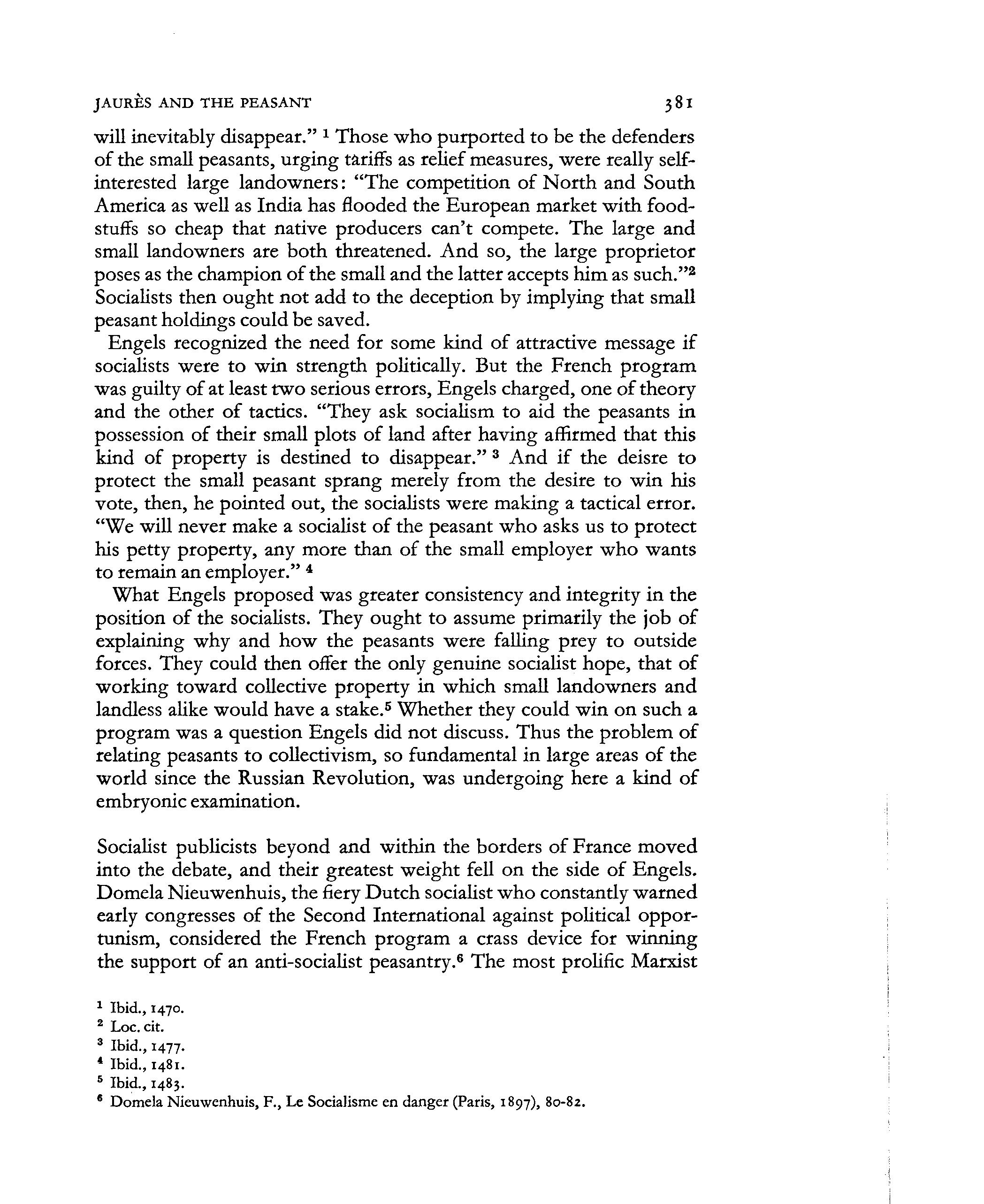
will inevitably disappear." x Those wh o purported t o be the defenders of the small peasants, urging tariffs as relief measures, were really selfinterested large landowners: "Th e competition of Nort h and South America as well as India has flooded the European market with foodstuffs so cheap that native producers can't compete. The large and small landowners are bot h threatened. And so, the large proprieto r poses as the champion of the small and the latter accepts him as such."2 Socialists then ought no t add t o the deception by implying that small peasant holdings could be saved.
Engels recognized the need for some kind of attractive message if socialists were t o win strength politically. But the French progra m was guilty of at least tw o serious errors, Engels charged, one of theory and the other of tactics. "They ask socialism t o aid the peasants in possession of their small plots of land after having affirmed that this kind of property is destined t o disappear." 3 And if the deisre t o protect the small peasant sprang merely from the desire t o win his vote, then, he pointed out, the socialists were making a tactical error "We will never make a socialist of the peasant wh o asks us t o protect his petty property, any more than of the small employer wh o wants t o remain an employer." 4
What Engels proposed was greater consistency and integrity in the position of the socialists. They ought t o assume primarily the job of explaining why and how the peasants were falling prey t o outside forces. They could then offer the only genuine socialist hope , that of working toward collective property in which small landowners and landless alike would have a stake.5 Whether they could win on such a program was a question Engels did not discuss. Thus the problem of relating peasants t o collectivism, so fundamental in large areas of the world since the Russian Revolution, was undergoing here a kind of embryonic examination.
Socialist publicists beyond and within the borders of France moved into the debate, and their greatest weight fell on the side of Engels. Domela Nieuwenhuis, thefieryDutc h socialist wh o constantly warned early congresses of the Second International against political opportunism, considered the French program a crass device for winning the support of an anti-socialist peasantry.6 The most prolific Marxist
1 Ibid., 1470
2 Loc cit
3 Ibid., 1477.
4 Ibid., 1481.
5 Ibid., 1483
6 Domel a Nieuwenhuis , F. , L e Socialisme en dange r (Paris, 1897), 80-82
JAURES AN D TH E PEASANT 3 8 1
Core terms of use, available at https://www.cambridge.org/core/terms. https://doi.org/10.1017/S002085900000095X Downloaded from https://www.cambridge.org/core. IP address: 207.241.231.80, on 19 Jul 2018 at 03:18:29, subject to the Cambridge

of the period, Karl Kautsky, wrote bluntly that "a socialist agricultural program for the protection of the peasants would be not only useless bu t completely erroneous." 1 But in an example of the kind of sophistry t o which Marxists at times resorted in bringing dogma and practice together, Kautsky then set down in detail "the measures by which we can prepare the agriculture of today for the socialist mode of production..." 2 What followed were proposals for social security, education, and cheap credit not to o different from the Marseilles resolutions.3 The Italian Gatti, in whose country collectivists also faced a rural majority, sided in theory with Engels, but took a less intransigent position. Thoug h he considered a reform program t o save small property as political opportunism4 he advocated cooperatives as a valid means for simultaneously relieving the peasants and preparing them for socialism.5
Among French socialists the grou p centered around the militant printer, Jean Allemane, was most critical of trying t o cater t o the small peasants Reacting strongly against the compromises demanded by daily politics, the Allemanists repeated the widely-heard accusation that the preservation of private ownership in land might win votes bu t would never produce socialism.6
T o bring some stability into the fluid state of socialist theory on agriculture, the London Congress of the Second International devoted its fifth session on July 30,1896, t o passing definitive resolutions on the problem. The report of the Committee on Agriculture began in the best tradition of socialist rhetoric :
"Th e evils which capitalistic exploitation, including landlordism, produce alike for the cultivator of the soil as for the whole of society at an ever increasing rate, can be definitively abolished only in a society in which land, like the other means of production, has become socialized." 7
But at the very brink of concrete proposals, the report made an admission which left the problem as unresolved as ever:
1 Kautsky, Karl, La Politique agraire du parti socialiste (Paris, 1903), 29
2 Ibid., 32.
3 Ibid., 54-213. The same equivocation is in Vandervelde, E., "Le Socialisme et la transformation capitaliste de Pagriculture," in La Revue socialiste, Vol. 31 (June, 1901), 641-661.
4 Gatti, G., Le Socialisme et l'agriculture (Paris, 1901), 266-268
5 Ibid., 334.
6 Le Parti Ouvrier, February 16 and September 21, 1895 Note also the scathing remarks by the philosopher of revolutionary syndicalism, Georges Sorel, in his preface to Pelloutier, Fernand, Histoire des bourses du travail (Paris, 1902), 14-15.
7 International Socialist Workers and Trade Union Congress, Report of Proceedings (London, 1896), 25
38 2 HARVEY GOLDBERG
Core terms of use, available at https://www.cambridge.org/core/terms. https://doi.org/10.1017/S002085900000095X Downloaded from https://www.cambridge.org/core. IP address: 207.241.231.80, on 19 Jul 2018 at 03:18:29, subject to the Cambridge

"Th e conditions of land tenure and the division of classes among the agricultural population in different countries are, however, to o various for it t o be possible t o formulate a program which shall be binding for the labor parties of all countries as regards the means for attaining this end or the particular classes t o be won over." 1
I n the lively discussion that followed, led by Vandervelde and Lafargue, the wisdom of such a resolution was compared with the folly of trying t o make a policy universally applicable.2 The motion of the commission was then passed unanimously.
So it was that socialists, especially the Marxists, were caught in a vise. Devoted t o collectivism, they balked at defending property, even small peasant property. Tied t o a deterministic theory of history, they were convinced of the futility of trying t o stay the inevitable disappearance of peasant holdings. But in a country like France contact with the village was essential t o success. And then, in the bone of socialism was supposed t o lie the marrow of sympathy Ho w could socialists ignore misery, wherever it existed?
Jaures was far less hampered than his Marxist friends in the P.O.F . by the confines of dialectical materialism. Guesde and Lafargue had changed tactics on the agrarian question in 1892, bu t the shift was so abrupt that they were easily accused of merely adjusting t o electoral needs The mainsprings of socialism were significantly different for Jaures. As much as he appreciated the contribution of Marx, he was an idealist, for whom the motivation in socialism was the quest for justice.3 Sprung from such a tradition, he could neither ignore the plight of the needy no r accept abstractions about men among who m he had lived. Thus , while a mass of doctrinal cliches filled the air, Jaures gave socialism a stake in analyzing and proposing solutions for rural problems in.
The critics of socialism made capital of what seemed t o be theoretical contradictions. How, they asked, could socialists preach collective property t o urban workers while defending the property of peasants ? Jaures tried t o answer the charges, and in so doing he divorced
1 Ibid., 26.
2 Ibid., 28-29.
3 The idealism of Jaures, differentiating him from Marxism, is best brought out in his famous debate with Lafargue. See Jaures, Jean, et Lafargue, Paul, Idealisme et materialisme dans la conception de l'histoire (Paris, 1895)
AND THE PEASANT 38 3
JAURES
Core terms of use, available at https://www.cambridge.org/core/terms. https://doi.org/10.1017/S002085900000095X Downloaded from https://www.cambridge.org/core. IP address: 207.241.231.80, on 19 Jul 2018 at 03:18:29, subject to the Cambridge

socialism from rigid dogma. "Those profound philosophers of capitalism have been duped by words ! Socialism has n o systematic preference for one or another way of organizing labour." The criterion of judgment, he pointed out, speaking actually more for himself than for the entire movement, was the degree of independence a given type of economic organization yielded t o the workers.1
Perhaps stung by the criticism, however, Jaures tried t o define the meaning of collectivism as it applied t o the land. I t proposed t o ensure t o all those wh o worked the land a fair and full return for their labour.2 H e then repeated his familiar program of decent wages for farm workers, relief from unfavorable leases for tenants and sharecroppers, and cheap credit for small owners. 3 What he sought t o ensure was "th e right of all citizens t o the fruits of their labor, t o their legitimate property, and t o a decent living. " *
Le Temps, the great Parisian organ of moderate republicanism, attacked this position as a piece of duplicity t o win rural votes, charging that under collectivism only the state would be a proprietor.5 Responding that Le Temps was engaging in vulgar oversimplification in its identification of collectivism with primitive tribal communism, Jaures reiterated that socialism was not static but adaptive. Its moral center remained the same, bu t the institutions through which it expressed itself frequently changed.6
Once he returned t o the Chamber as a socialist in 1893, he spoke often in favor of agrarian reforms. As unofficial spokesman for the socialists, he made concrete proposals and helped t o answer the charges of negative sterility frequently aimed at socialist attacks. He intervened, for example, in the discussion of the budget for 1894 and urged a shift in the tax burden by replacing part of the land tax with a progressive inheritance tax.7 Thoug h unsuccessful, he rose again, on January 16, 1894, t o present another extended criticism of the tariff as the answer t o agrarian distress.
I t was at the time that the tariff commission, headed by the archprotectionist Meline, was proposing once more t o raise the duties on foreign, especially Russian, wheat Jaures introduced a counterproposal, co-sponsored by such socialists as Millerand, Viviani, Sembat, and Vaillant, which would have made the state the sole
1 La Depeche de Toulouse, January 11, 1893.
2 Loc. cit., October 18,1893.
3 Loc. cit.
4 Loc. cit., October 23,1893.
5 Le Temps, October 5 and 28,1893.
6 La Depeche de Toulouse, October 30,1893.
7 Journal Official, Chambre des Deputes, June 15,1893
38 4 HARVEY GOLDBERG
Core terms of use, available at https://www.cambridge.org/core/terms. https://doi.org/10.1017/S002085900000095X Downloaded from https://www.cambridge.org/core. IP address: 207.241.231.80, on 19 Jul 2018 at 03:18:29, subject to the Cambridge
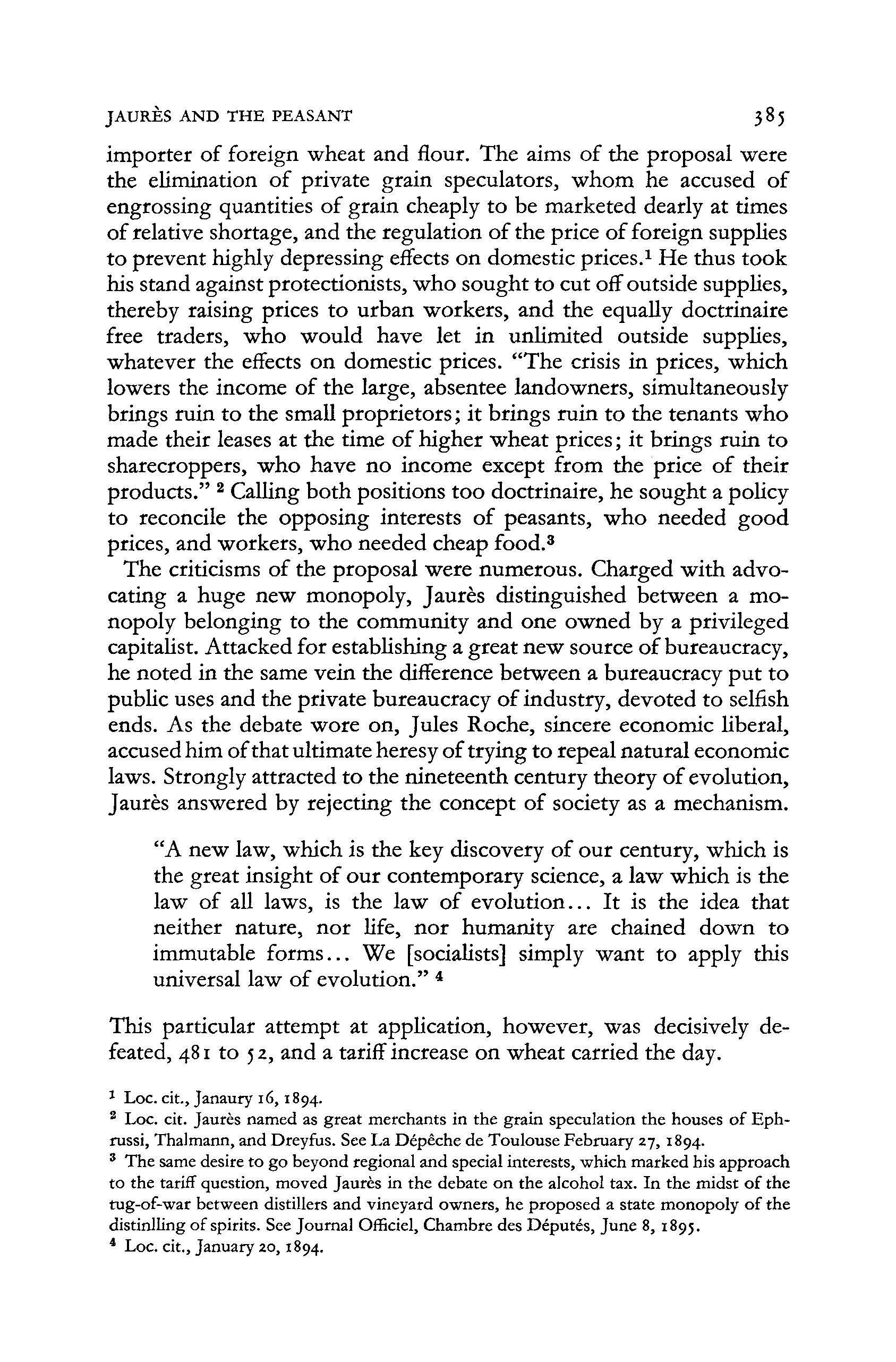
importer of foreign wheat and flour. The aims of the proposal were the elimination of private grain speculators, whom he accused of engrossing quantities of grain cheaply t o be marketed dearly at times of relative shortage, and the regulation of the price of foreign supplies t o prevent highly depressing effects on domestic prices.1 H e thus took his stand against protectionists, wh o sought t o cut off outside supplies, thereby raising prices t o urban workers, and the equally doctrinaire free traders, wh o would have let in unlimited outside supplies, whatever the effects on domestic prices. "Th e crisis in prices, which lowers the income of the large, absentee landowners, simultaneously brings ruin t o the small proprietors ; it brings ruin t o the tenants wh o made their leases at the time of higher wheat prices; it brings ruin t o sharecroppers, wh o have n o income except from the price of their products. " 2 Calling both positions to o doctrinaire, he sought a policy t o reconcile the opposing interests of peasants, wh o needed good prices, and workers, who needed cheap food.3
The criticisms of the proposal were numerous. Charged with advocating a huge new monopoly, Jaures distinguished between a monopoly belonging t o the community and one owned by a privileged capitalist. Attacked for establishing a great new source of bureaucracy, he noted in the same vein the difference between a bureaucracy pu t t o public uses and the private bureaucracy of industry, devoted t o selfish ends. As the debate wore on, Jules Roche, sincere economic liberal, accused him of that ultimate heresy of trying t o repeal natural economic laws. Strongly attracted t o the nineteenth century theory of evolution, Jaures answered by rejecting the concept of society as a mechanism
"A new law, which is the key discovery of our century, which is the great insight of our contemporary science, a law which is the law of all laws, is the law of evolution.. . I t is the idea that neither nature, no r life, no r humanity are chained down t o immutable forms.. . We [socialists] simply want t o apply this universal law of evolution." 4
This particular attempt at application, however, was decisively defeated, 481 t o 5 2, and a tariff increase on wheat carried the day.
1 Loc. cit , Janaury 16,1894.
2 Loc cit Jaures named as great merchants in the grain speculation the houses of Ephrussi, Thalmann, and Dreyfus. See La Depeche de Toulouse February 27, 1894.
3 The same desire to go beyond regional and special interests, which marked his approach to the tariff question, moved Jaures in the debate on the alcohol tax. In the midst of the tug-of-war between distillers and vineyard owners, he proposed a state monopoly of the distinlling of spirits See Journal Officiel, Chambre des Deputes, June 8, 1895
4 Loc cit., January 20,1894
JAURES AND THE PEASANT 385
Core terms of use, available at https://www.cambridge.org/core/terms. https://doi.org/10.1017/S002085900000095X Downloaded from https://www.cambridge.org/core. IP address: 207.241.231.80, on 19 Jul 2018 at 03:18:29, subject to the Cambridge
Foreshadowing their great duel between 1896 and 1898 1 , Meline clashed frequently with Jaures on the agrarian question The future Premier accused the socialist of preparing the ruin of agriculture by advocating the nationalization of land, an accusation warmly supported by Le Temps.2 Such criticisms led Jaures t o outline very concretely the measures his party was proposing for rural amelioration. Tax relief was a pressing need, bu t it could be achieved only by shifting the fiscal burden t o progressive income and inheritance taxes. Cheap credit would become possible, he insisted, only after the socialist measure of nationalizing the dominant Bank of France. Far from preparing the depopulation of the villages with such moves, the socialists aimed "t o hold them [the peasants] on the land by.. . ensuring that they wor k for themselves and no t for absentee landlords living in the big cities." 3
But the charge that the socialists wanted immediate nationalization of the land died hard. Hostile critics found it convenient t o recall the abrupt shift in the line of the P.O.F. 4 But when they tried t o accuse Jaures of the same deception 5 , the critics were on unsafe ground. He believed, of course, that the trend in agriculture, as in industry and commerce, was toward concentration. "I n the Cher, the Nievre, the Allier," he wrote , "large holdings are being formed; there are entire parishes which belong t o tw o or three men..." 6 He believed that trend t o be inevitable. But Jaures was far to o concrete and humane t o let the issue rest there However short-range his help might be, he could hardly have advocated tearing the plots from beneath peasants for who m he had such deep sympathy. Of course, he could not convince all the peasants, even of his own constituency, that he was really sincere.7 But his association with the countryside probably went further in pushing socialism into the villages than the polished rhetoric of many of his colleagues.
Th e high point in the Parliamentary campaign waged by Jaures for agricultural reform came in an extended intervention, occupying three entire sessions in the summer of 1897. So impressive a campaign did this represent, so much did it sum up the extent of socialist concern for the peasant, that its three parts were brought together in an oftreprinted brochure, Socialisme et paysans. 8
1 Jaures was a constant critic of the conservative Meline Ministry, 1896-1898.
2 Le Temps, October 29,1894
3 Journal Officiel, Chambre des Deputes, October 27,1894
4 Le Temps, July 29,1893
5 Le Telegramme, November 23,1895
6 La Depeche de Toulouse, April 24,1894.
7 Auclair, op. cit., 324-325.
8 It wasfirstprinted in Paris in 1897.
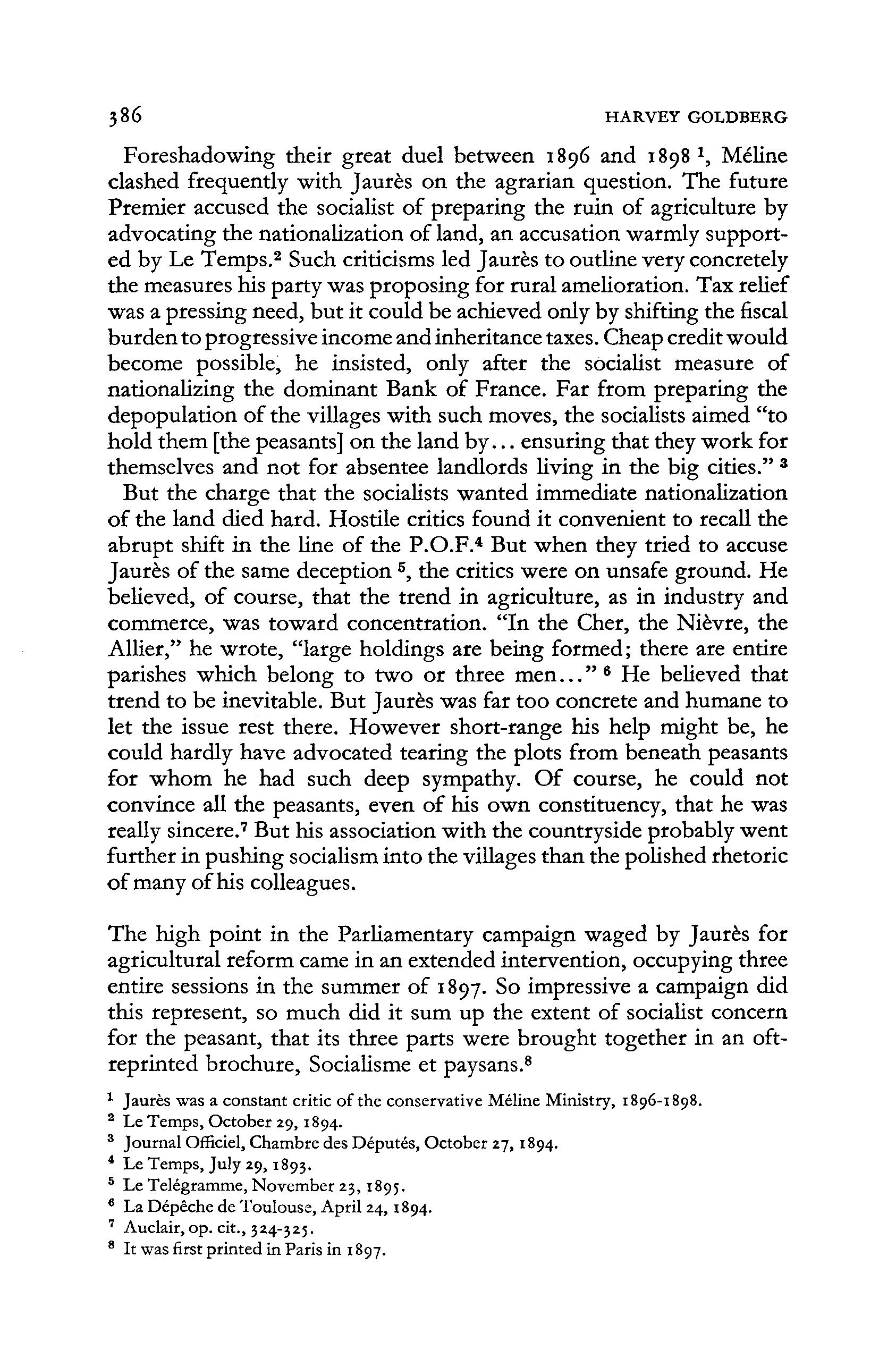
at https://www.cambridge.org/core/terms.
38 6 HARVEY GOLDBERG
Core terms of use, available
https://doi.org/10.1017/S002085900000095X Downloaded from https://www.cambridge.org/core. IP address: 207.241.231.80, on 19 Jul 2018 at 03:18:29, subject to the Cambridge
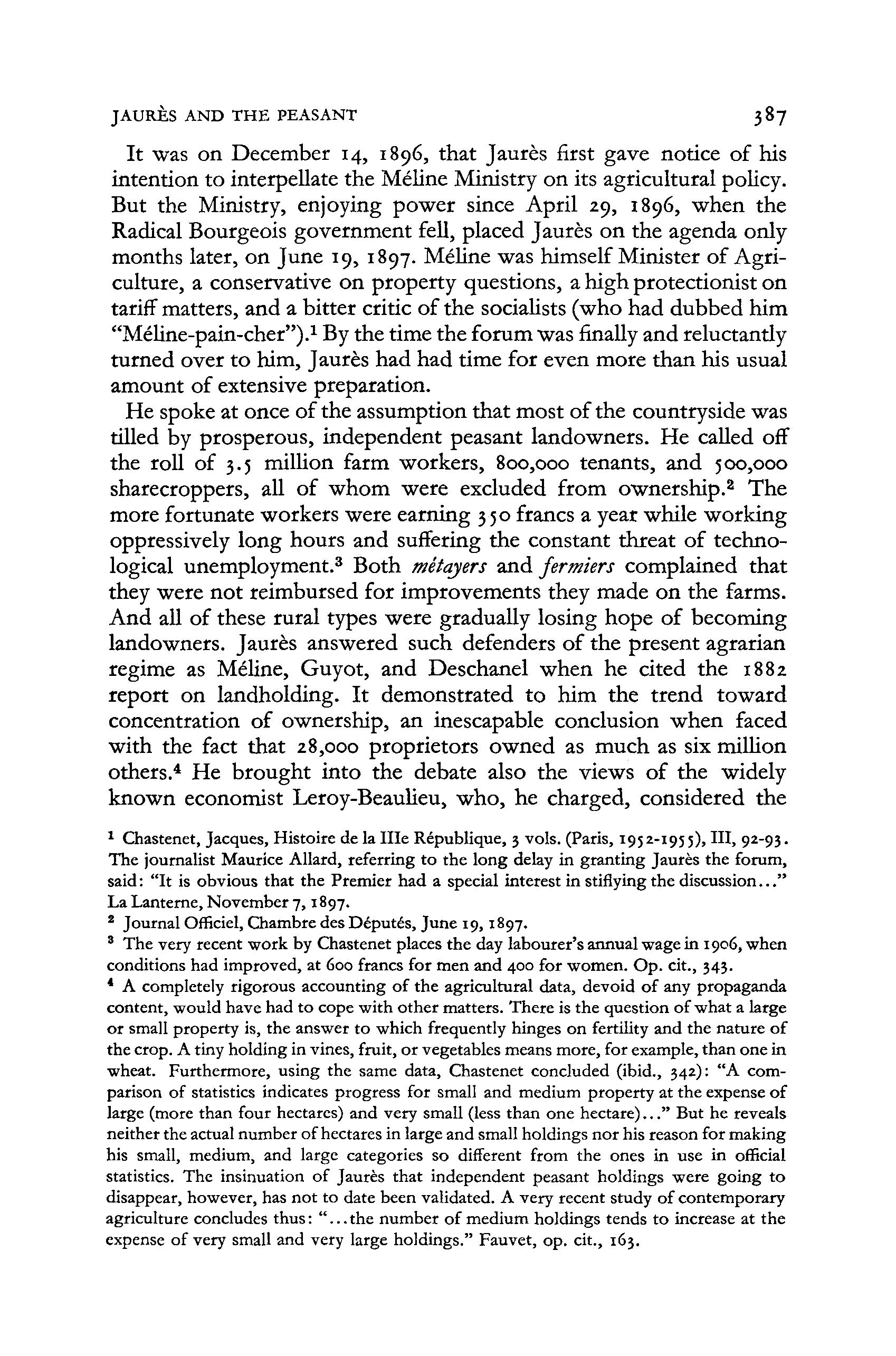
I t was on December 14, 1896, that Jaures first gave notice of his intention t o interpellate the Meline Ministry on its agricultural policy. But the Ministry, enjoying power since April 29, 1896, when the Radical Bourgeois government fell, placed Jaures on the agenda only months later, on Jun e 19, 1897. Meline was himself Minister of Agriculture, a conservative on property questions, a high protectionist on tariff matters, and a bitter critic of the socialists (who had dubbed him "Meline-pain-cher").1 By the time the forum wasfinallyand reluctantly turned over t o him, Jaures had had time for even more than his usual amount of extensive preparation.
He spoke at once of the assumption that most of the countryside was tilled by prosperous, independent peasant landowners He called off the roll of 3.5 million farm workers, 800,000 tenants, and 500,000 sharecroppers, all of whom were excluded from ownership.2 Th e more fortunate workers were earning 350 francs a year while working oppressively long hours and suffering the constant threat of technological unemployment.3 Both metayers and fermiers complained that they were not reimbursed for improvements they made on the farms. And all of these rural types were gradually losing hope of becoming landowners. Jaures answered such defenders of the present agrarian regime as Meline, Guyot, and Deschanel when he cited the 1882 report on landholding. I t demonstrated t o him the trend toward concentration of ownership, an inescapable conclusion when faced with the fact that 28,000 proprietors owned as much as six million others.4 He brough t int o the debate also the views of the widely known economist Leroy-Beaulieu, who , he charged, considered the
1 Chastenet, Jacques, Histoire de la Hie Republique, 3 vols (Paris, 1952-195 5), III, 92-93 The journalist Maurice Allard, referring to the long delay in granting Jaures the forum, said: "It is obvious that the Premier had a special interest in stiflying the discussion..." La Lanterne, November 7,1897.
2 Journal Officiel, Chambre des Deputes, June 19,1897.
3 The very recent work by Chastenet places the day labourer's annual wage in 1906, when conditions had improved, at 600 francs for men and 400 for women. Op . cit., 343.
4 A completely rigorous accounting of the agricultural data, devoid of any propaganda content, would have had to cope with other matters There is the question of what a large or small property is, the answer to which frequently hinges on fertility and the nature of the crop A tiny holding in vines, fruit, or vegetables means more, for example, than one in wheat. Furthermore, using the same data, Chastenet concluded (ibid., 342): "A comparison of statistics indicates progress for small and medium property at the expense of large (more than four hectares) and very small (less than one hectare)..." But he reveals neither the actual number of hectares in large and small holdings nor his reason for making his small, medium, and large categories so different from the ones in use in official statistics The insinuation of Jaures that independent peasant holdings were going t o disappear, however, has not to date been validated A very recent study of contemporary agriculture concludes thus: ".. the number of medium holdings tends to increase at the expense of very small and very large holdings." Fauvet, op cit., 163
38 7
JAURES AND THE PEASANT
Core terms of use, available at https://www.cambridge.org/core/terms. https://doi.org/10.1017/S002085900000095X Downloaded from https://www.cambridge.org/core. IP address: 207.241.231.80, on 19 Jul 2018 at 03:18:29, subject to the Cambridge

disapperance of small, inefficient owners both inevitable and desirable for economic progress. 1 Jaures was, of course, implying that bourgeois theorists, wh o had consistently attacked the socialist threat t o private property, were themselves referring t o its alteration without conspicuous regret.
But how did Jaures aim t o cope with the very immediate threat of foreign competition? Repeating his often-heard attacks on the tariff solution, 2 he urged instead reduction of financial burdens on small peasants, helping them t o find capital for land improvement by which they could better compete. This was possible only by removing some pressure, public and private, which dissipated their income and forced them into technological backwardness. He exposed particularly the role of the great processors, powerful enough t o force down prices paid t o the small producers. Sugar refiners, already beneficiaries of a government subsidy t o meet foreign competition, were nevertheless threatening further price reductions t o sugar-beet farmers; the big millers, wh o were progressively driving out small, indepedent competitors, were acting as a syndicate of speculators determining the price paid for wheat; at Roquefort, where there had been great competition among the small cheese factories, a large, impersonal company had come t o dominate and t o force down the price of milk from Aveyron. 3 His solution lay in the nationalization of the processing industries.
T o treat an agricultural problem as structurally complex as the one Jaures had outlined, what kind of program could he suggest that would be immediately helpful and ultimately useful? The long-range socialist goals he set out as the increase of production t o raise consumption and the transformation of property t o ensure universal security. But the path toward these general objectives had t o be marked by those many concrete reforms, which had constituted the socialist rural program since the Congress of Marseilles.
The criticism of Engels and others in the Second International was sufficiently disturbing t o require a public response And Jaures answered out of his considerably less dogmatic reading of socialism. "T o that argument we say... that between large landholding and small there is no t only a quantitative difference, but in some measure a qualitative one ; the former is an expression of capital, the latter of labor. " 4 Refusing t o blueprint the dimensions of a new property order
1 Journal Officiel, Chambre des Deputes, June 26,1897.
2 Loc. cit.
3 Loc. cit. Note his further discussion of the "Societe de Roquefort" in La Depeche de Toulouse, September 23, 1897.
* Journal Officiel, Chambre des Deputes, June 26, 1897.
38 8 HARVEY GOLDBERG
Core terms of use, available at https://www.cambridge.org/core/terms. https://doi.org/10.1017/S002085900000095X Downloaded from https://www.cambridge.org/core. IP address: 207.241.231.80, on 19 Jul 2018 at 03:18:29, subject to the Cambridge
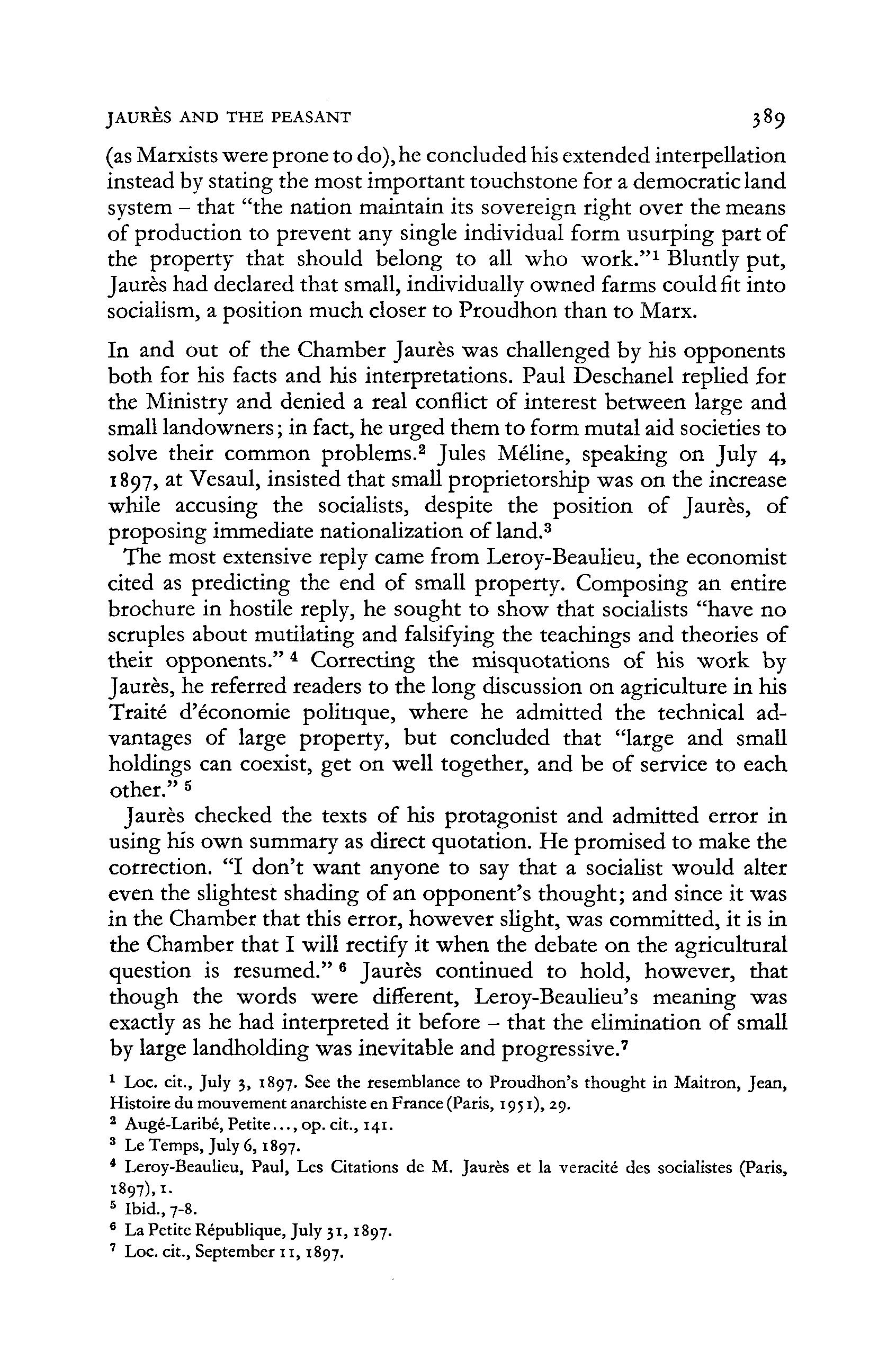
(as Marxists were prone t o do), he concluded his extended interpellation instead by stating the most important touchstone for a democratic land system - that "the nation maintain its sovereign right over the means of production t o prevent any single individual form usurping part of the property that should belong t o all who work." 1 Bluntly put , Jaures had declared that small, individually owned farms could fit into socialism, a position much closer t o Proudho n than t o Marx.
In and out of the Chamber Jaures was challenged by his opponents both for his facts and his interpretations. Paul Deschanel replied for the Ministry and denied a real conflict of interest between large and small landowners; in fact, he urged them t o form mutal aid societies t o solve their common problems.2 Jules Meline, speaking on July 4, 1897, at Vesaul, insisted that small proprietorship was on the increase while accusing the socialists, despite the position of Jaures, of proposing immediate nationalization of land.3
The most extensive reply came from Leroy-Beaulieu, the economist cited as predicting the end of small property. Composing an entire brochure in hostile reply, he sought t o show that socialists "have n o scruples about mutilating and falsifying the teachings and theories of their opponents." 4
Correcting the misquotations of his wor k by Jaures, he referred readers t o the long discussion on agriculture in his Traite d'economie politique, where he admitted the technical advantages of large property, but concluded that "large and small holdings can coexist, get on well together, and be of service t o each other." 5
Jaures checked the texts of his protagonist and admitted error in using his own summary as direct quotation. He promised t o make the correction. " I don' t want anyone t o say that a socialist would alter even the slightest shading of an opponent's thought ; and since it was in the Chamber that this error, however slight, was committed, it is in the Chamber that I will rectify it when the debate on the agricultural question is resumed." 6 Jaures continued t o hold, however, that though the words were different, Leroy-Beaulieu's meaning was exactly as he had interpreted it before - that the elimination of small by large landholding was inevitable and progressive.7
1 Loc. cit., July 3, 1897. See the resemblance to Proudhon's thought in Maitron, Jean, Histoire du mouvement anarchiste en France (Paris, 1951), 29.
2 Auge-Laribe, Petite... , op. cit., 141.
3 Le Temps, July 6,1897.
4 Leroy-Beaulieu, Paul, Les Citations de M. Jaures et la veracite des socialistes (Paris, 1897), 1.
5 Ibid., 7-8.
6 La Petite Republique, July 31,1897.
7 Loc. cit., September 11,1897.
38 9
JAURES AND THE PEASANT
Core terms of use, available at https://www.cambridge.org/core/terms. https://doi.org/10.1017/S002085900000095X Downloaded from https://www.cambridge.org/core. IP address: 207.241.231.80, on 19 Jul 2018 at 03:18:29, subject to the Cambridge
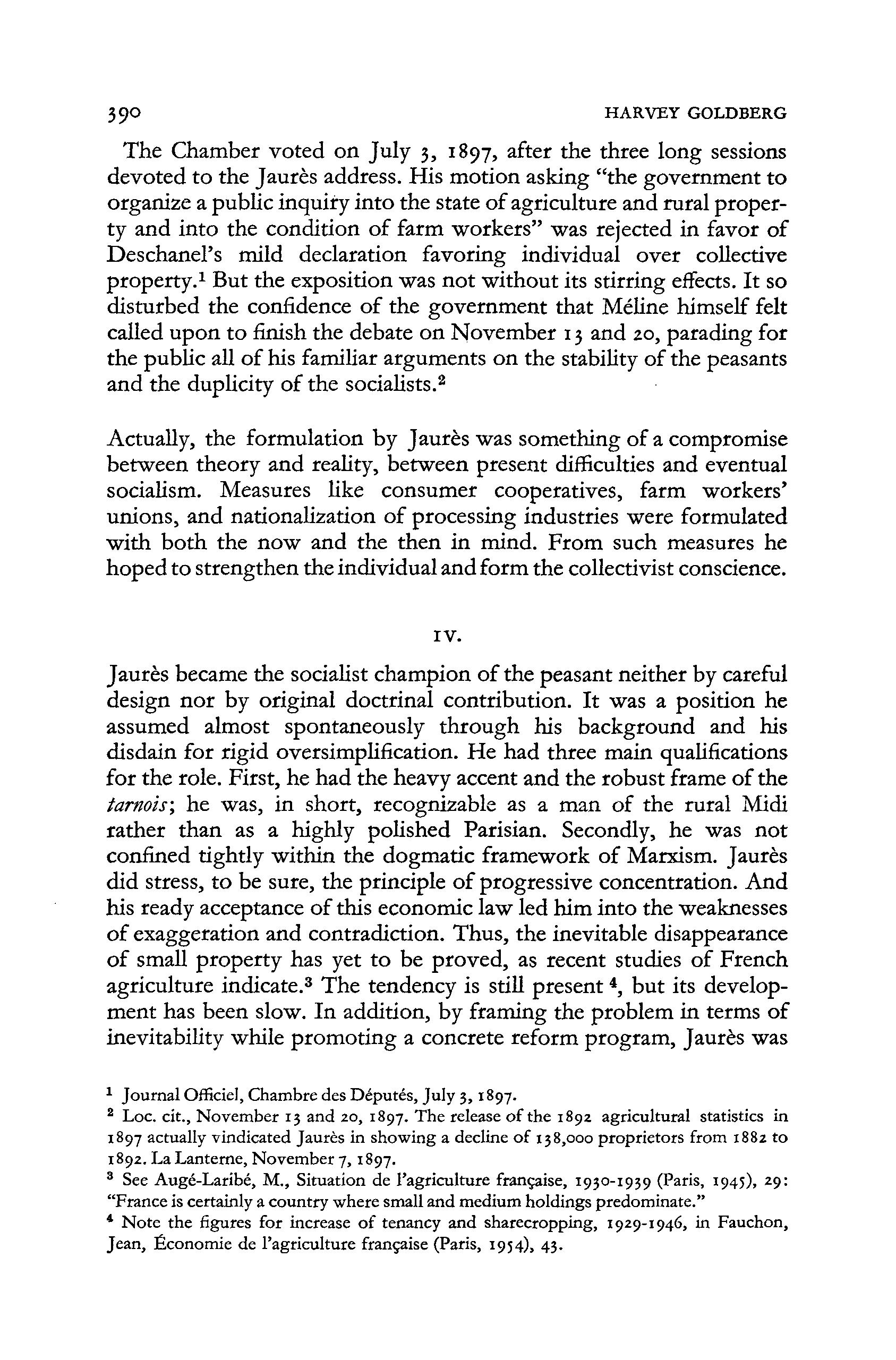
The Chamber voted on July 3, 1897, after the three long sessions devoted t o the Jaures address. His motion asking "the government t o organize a public inquiry int o the state of agriculture and rural property and into the condition of farm workers " was rejected in favor of DeschanePs mild declaration favoring individual over collective property.1 But the exposition was no t without its stirring effects. I t so disturbed the confidence of the government that Meline himself felt called upo n t o finish the debate on November 13 and 20, parading for the public all of his familiar arguments on the stability of the peasants and the duplicity of the socialists.2
Actually, the formulation by Jaures was something of a compromise between theory and reality, between present difficulties and eventual socialism. Measures like consumer cooperatives, farm workers ' unions, and nationalization of processing industries were formulated with bot h the now and the then in mind. Fro m such measures he hoped t o strengthen the individual and form the collectivist conscience.
IV.
Jaures became the socialist champion of the peasant neither by careful design no r by original doctrinal contribution. I t was a position he assumed almost spontaneously throug h his background and his disdain for rigid oversimplification. H e had three main qualifications for the role. First, he had the heavy accent and the robust frame of the tarnois; he was, in short, recognizable as a man of the rural Midi rather than as a highly polished Parisian. Secondly, he was no t confined tightly within the dogmatic framework of Marxism Jaures did stress, t o be sure, the principle of progressive concentration. And his ready acceptance of this economic law led him into the weaknesses of exaggeration and contradiction. Thus , the inevitable disappearance of small propert y has yet t o be proved , as recent studies of French agriculture indicate.3 The tendency is still present 4 , but its development has been slow. I n addition, by framing the problem in terms of inevitability while promotin g a concrete reform program, Jaures was
1 Journal Officiel, Chambre des Deputes, July 3,1897.
2 Loc cit., November 13 and 20, 1897 The release of the 1892 agricultural statistics in 1897 actually vindicated Jaures in showing a decline of 138,000 proprietors from 1882 to 1892 LaLanterne, November 7,1897
3 See Auge-Laribe, M., Situation de l'agriculture francaise, 1930-1939 (Paris, 1945), 29: "France is certainly a country where small and medium holdings predominate."
* Note the figures for increase of tenancy and sharecropping, 1929-1946, in Fauchon, Jean, ficonomie de 1'agriculture francaise (Paris, 1954), 43.
39 ° HARVEY GOLDBERG
Core terms of use, available at https://www.cambridge.org/core/terms. https://doi.org/10.1017/S002085900000095X Downloaded from https://www.cambridge.org/core. IP address: 207.241.231.80, on 19 Jul 2018 at 03:18:29, subject to the Cambridge
caught in the methodological weakness of most of reformist socialism.1 But he rather consistently vaulted over dogma t o advocate an empirical program that satisfied his ideal of justice.
Finally, he gave his socialism a moral fervor, which n o so-called scientific formulation could match. I n reducing the agrarian problem t o its component parts, he was able t o reveal the special difficulties that beset many landed types. I n formulating for them a progra m of relief, he illustrated the premise that socialism stood for a better life.2
The exact degree t o which Jaures helped socialist success in the villages is impossible t o evaluate. H e himself wo n elections, except in 1889 and 1898, in a primarily rural area. Beyond that, socialism was making headway in the countryside by offering practical reforms. Fro m the Congress of Limoges in 1906 t o the Congress of Saint-Quentin in 1911, the unified Socialist Party emphasized its respect for the private property of the peasants.3 And its successes were at least enough t o frighten the opposition 4 and t o lay the groundwor k for later and greater socialist strength in rural areas. 5
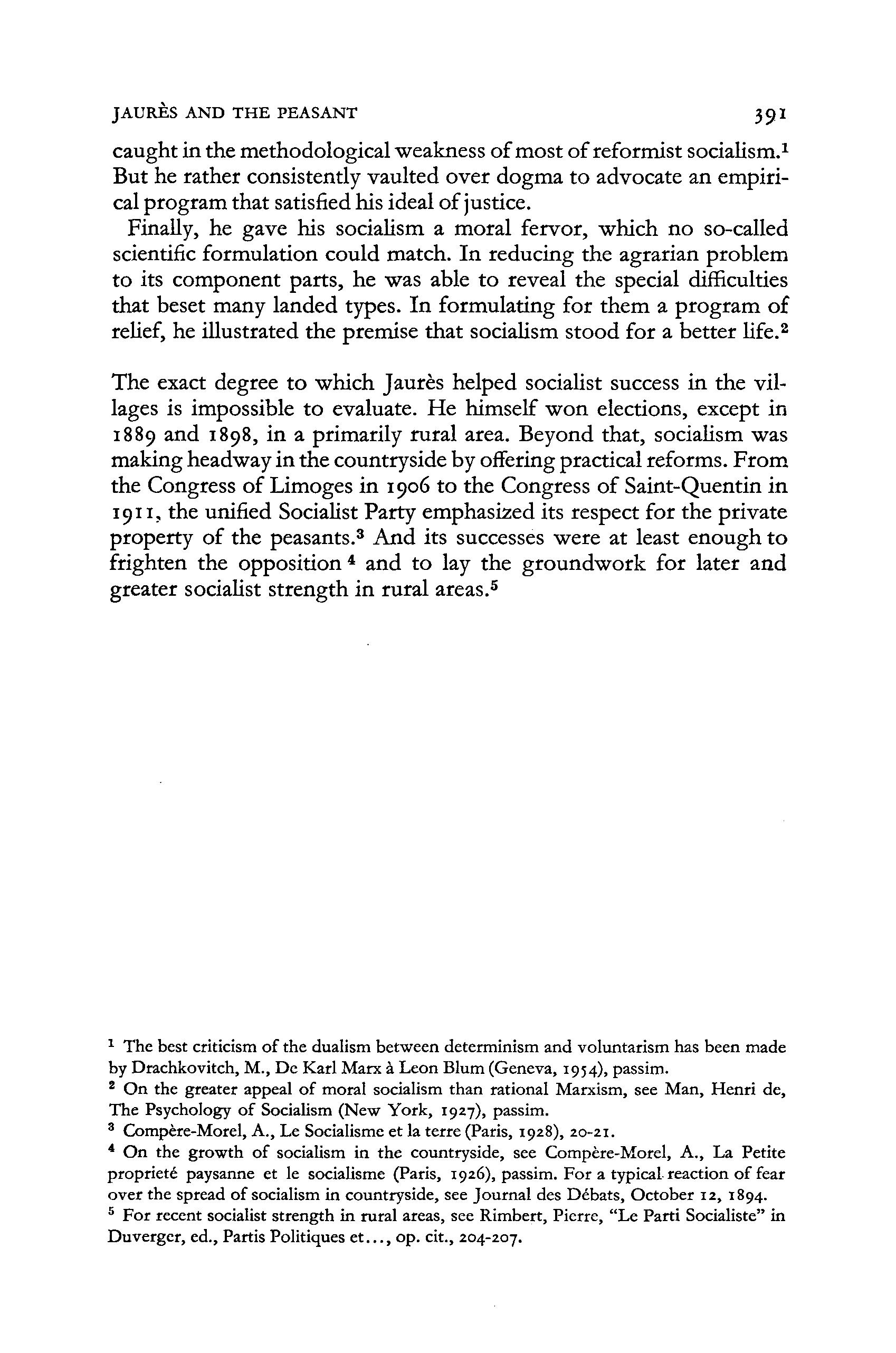
1 The best criticism of the dualism between determinism and voluntarism has been made by Drachkovitch, M., De Karl Marx a Leon Blum (Geneva, 1954), passim
2 On the greater appeal of moral socialism than rational Marxism, see Man, Henri de, The Psychology of Socialism (New York, 1927), passim.
3 Compere-Morel, A., Le Socialisme et la terre (Paris, 1928), 20-21.
4 On the growth of socialism in the countryside, see Compere-Morel, A., La Petite propriete paysanne et le socialisme (Paris, 1926), passim For a typical reaction of fear over the spread of socialism in countryside, see Journal des Debats, October 12, 1894
5 For recent socialist strength in rural areas, see Rimbert, Pierre, "Le Parti Socialiste" in Duverger, ed., Partis Politiques et... , op. cit., 204-207.
3 9 1
JAURES AND THE PEASANT
Core terms of use, available at https://www.cambridge.org/core/terms. https://doi.org/10.1017/S002085900000095X Downloaded from https://www.cambridge.org/core. IP address: 207.241.231.80, on 19 Jul 2018 at 03:18:29, subject to the Cambridge

